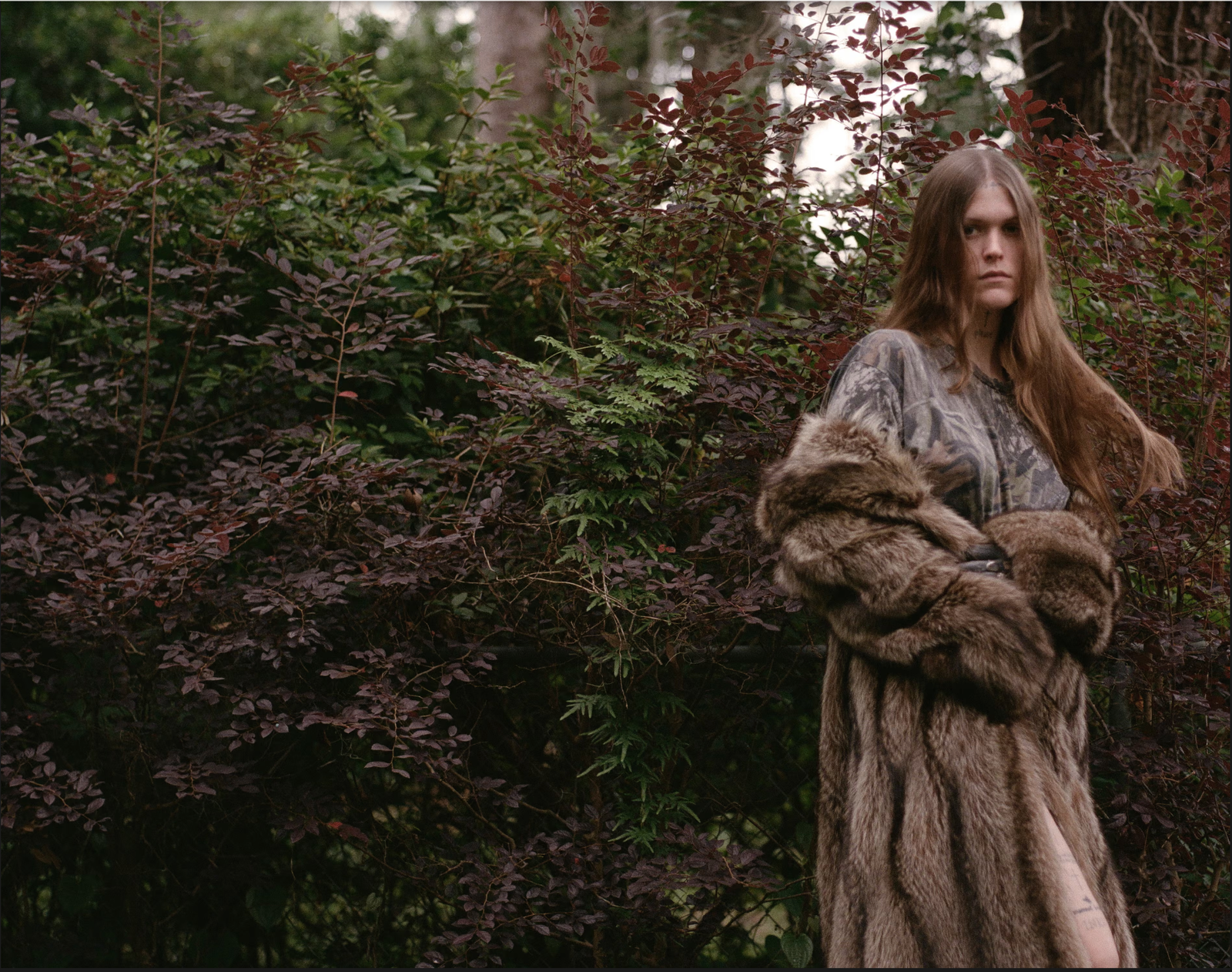On the commanding Willoughby Tucker, I’ll Always Love You, Ethel Cain invites you to relive the pain of your teenage angst, anxiety, and first loves.
Release date: August 8, 2025 | Daughters of Cain | Facebook | Instagram | Website
Believe it or not, I was a teenager once. It was way back in the eighties and it lasted for six sordid years. It was a time of flared collars and Talking Heads and the AIDS crisis. It was Ronald Reagan and Back to the Future and the heyday of real, innovative punk rock. I was in the middle of all of that, my toes splayed apart as far as they could be, so I could dip them into one group or the other. As a result, I wasn’t part of any of them, but I did find my tribe of nerdy, unattractive males who all shared the same lunch table.
When we had classes together, we would pass notes around to each other. At the time, it was a pretty creative endeavor. Folding the paper over multiple times so it was about the size of a large matchbook, someone would write a single sentence followed by three ellipses and pass it to the guy behind them, who would add another layer to the story, building a wildly erratic, unwieldy time capsule of what we would now describe as teenage angst. For a reason unbeknownst to me, I saved those notes forever. Forty years later, I have them in a three-ring binder, protected by plastic. I had the idea of publishing them as part of blog, but when I read through them I was taken back to a teenager whom I had forgotten all about.
The notes were littered with misogyny, racism, and homophobia. It was a closeted fear that came through in our 16-year-old attempts at humor. And some of the comments were deeply disturbing. It’s hard for me to come to grips with the person I was, but I can be forgiving because I was – like many teenagers – an idiot. That frontal lobe was far from forming, and while that’s not an excuse, it is acknowledging that kids make mistakes, and we can unlearn these kinds of things. I’ve spent most of my adult life as a champion for the oppressed, in one form or the other, and feel like the person I was (or was pretending to be) is very different than the person I am now. Scratch that, I KNOW the person I am now is very different than the person I was then.
Hayden Anhedönia of Ethel Cain has essentially grown up before our eyes, which is what happens in the 21st century. At 26, she may be the most powerful voice of her generation, not in terms of success, but in how she conveys her understanding of a generation whose future is as uncertain as any generation preceding it. Like many her age, her life has been lived on the Internet. Her troublesome posts from when she was nineteen – adolescent attempts at stirring the proverbial pot – have brought her to task before the very public that adores her. And, for the most part, she’s handled it as well as she can. Like myself, she’s a different person, and while she can acknowledge that those words did, indeed, leave her head, travel through her fingers to the keyboard, and onto Tumblr for the world to see, it’s not who she is. I, for one, believe her. Life is an arc, and we’re never tethered to the same place.
Willoughby Tucker, I’ll Always Love You is a testament to how well Anhedönia understands that arc. As Ethel Cain, Anhedönia presents as an artist whose adolescent trauma lingers in every note of her music. Her second full-length album, a prequel to 2022’s Preacher’s Daughter, stands to cement Anhedönia as one of the most significant artists of the past few years. When juxtaposed against the dismal brilliance of Perverts, a metaphysical exploration of sexual pain and exploitation, Willoughby represents a breath of ‘fresh’ air, even if that air is tempered with the remnants of mustard gas and shrapnel. Ostensibly a concept album about the character Ethel Cain and her relationship with Willoughby Tucker, whose life has been overshadowed by the post-traumatic stress his father carried since coming back from Vietnam, the record nonetheless tackles many of the same issues that made Perverts such a powerful piece of art.
The first song on Ethel Cain‘s new album sets the narrative tone. “Janie” is about that friend you’ve had for years who gets their first boyfriend or girlfriend and then disappears. It’s happened to all of us (well, it didn’t happen to the proto-incels I was friends with in the eighties, since very few of us got near the opposite sex). It’s one of those profoundly emotional experiences that defines our youth. It’s emotions on fire, with no flame retardant in sight. It’s a slow entry into the album: the musical arrangement is rudimentary, with the guitar up front and in your head, as if Anhedönia is slowly easing you into the pain of understanding.
The album contains three instrumental interstitials, the first of which is “Willoughby’s Theme.” An old piano trickles in with occasional noises from the distance, on top of nuanced, simple drones. The existential pain of loss and tragedy is announced with the arrival of huge distorted two-chord noise, a sinister dive into grief. The unpacking of these chords sounds like the emotional evisceration that takes place during adolescence. The song sets up the one-two punch of singles “Fuck Me Eyes” and “Nettles”. Anhedönia knows that what she demands of the listener is much more than the average pop star, if she’s even part of that conversation, and “Willoughby’s Theme” gives you a moment to breathe before you dive into the next fifteen minutes of pain.
“Fuck Me Eyes” is tragedy dressed in the accoutrements of ‘80s new wave. Synth keys drift away over the chord progression and her layered vocals. The programmed drums sound like something from a Don Henley song or a morbid version of Kim Carnes‘s “Bette Davis Eyes”. Anhedönia’s lyrics hit as hard as a right to the face: ‘She’s scared of nothing but the passenger’s side of some old man’s truck in the dark parking lot,’ she sings, ‘She’s just tryna feel good right now’.
The song features some of the most powerful vocals she’s ever recorded. By the time it reaches its peak, and Anhedönia is bellowing ‘they want to take her out, but they never want to take her home’, she’s encapsulated the absolute broken agony that trauma can inflict, and how much deeper those wounds can be for someone at such a young age. Even fit within the literal narrative of Willoughby Tucker’s story, when looked at from a wider perspective the power of “Fuck Me Eyes” is a testament to Ethel Cain‘s ability to articulate the adolescent experience.
There’s a unsettling sadness (of course) to Willoughby’s lead single “Nettles”. As a dark gothic piece draped in the instrumentation of the southern swamp – fiddles bent beyond recognition, a pedal steel, the simple plucked guitars – there’s a geography created that gives the song its power. Be it the nettles that stick to your jeans as you muck through the swampy loam to escape disappointment or the nettles that stick your heart with each micro-aggressive insult thrown towards you by your ‘friends’, they sting regardless. As part of the storyline of Willoughby, Ethel the character has the time to reflect on her relationship with Willoughby: ‘To love me is to suffer me’ she sings, buried under the pedal steel, a poignant afterthought.
Production-wise, everything on Willoughby is precise and massive, and made to surround the listener. It’s like getting a bear-hug from the creepy uncle: you can feel the muscles, the stubble from his chin against your cheek, the slight bulge through his Wrangler’s, and the sensations act as a fuse that had once burnt out being lit again.
The second instrumental “Willoughby’s Interlude”, coming after the powerful jab and cross of “Fuck Me Eyes” and “Nettles”, is another opportunity to just sit and contemplate Ethel Cain’s journey of pain and self-flagellation. Each instrumental acts as a moment between rounds, arms splayed over the ropes as the coaches rub the blood from your eyes, only to send you back again to get your ass beat.
“Dust Bowl” continues with the Southern gothic motif drenched in slowcore misery. The song barely moves, like awakening from a horrible car wreck. While Ethel Cain’s albums always tell a story, these stories exist as a way of unpacking deeper meanings. “Dust Bowl” represents this exposure to understanding: rarely do we have pure insight into ourselves, much less others. In “Dust Bowl” – ostensibly about recognizing the depths of despair Willoughby and Ethel find themselves in – she’s able to see both for who they are. After the line ‘Grew up hard, fell off harder/Cooking our brains smoking that shit your daddy smoked in Vietnam’, the song is punctuated by a heavily distorted guitar that continues through the outro. There’s an anger and desperation accompanying the piece to its end. It’s the worries of youth, of losing what’s around you, of having to face a future that seems largely unknown. ‘Eighth grade death pact, strike me dead’, Anhedönia sings early in the song. It’s a fear that the unknown will be the end of all of us. Ultimately though, Ethel Cain‘s theme is pretty simple: being a teenager fucking sucks.
“A Knock on the Door” features a gently picked guitar, the sound of fingers sliding across the fret board. Anhedönia is barely whispering, swallowing the consonants as she sings about being locked up in the State pen and foaming at the mouth. The song, like the rest of the album, is firmly entrenched in the Now. Ethel Cain operates within the parameters that dictate a pop-music genre dominated by Olivia Rodrigos and Billie Eilishes and Lana Del Reys; she whisper-sings much of the album, as if afraid to put too much of herself out there. While those other artists do it to dominate the cultural zeitgeist, she does it because Ethel Cain is not comfortable in her own skin, and she knows that this is something millions of others feel as well. A knock on the door could be the worst thing to happen to anyone, or it could be the sign of a new opportunity. It could be an indication that it’s time to wake up and move through the slumber of life. Either way, it’s a call to action, and demands a response.
The steady beat of a vital sign monitor announces the third interstitial on the album, the haunting “Radio Towers”. A keyboard drenched in delay, over a dissonant groan in the background, mimics the unseen electromagnetic waves that course through the atmosphere, acting to connect all of us. Willoughby Tucker, I’ll Always Love You is about understanding ourselves in the midst of a world in which we are all way more connected than any of us should be. It’s another moment of mindfulness that gives the listener time to discern the southern misery of “Dust Bowl” and “A Knock on the Door”, a momentary lapse that ends up twisting in on itself.
“Radio Towers” gives way to the sad, monolithic tragedy of penultimate song “Tempest”. It’s the end of a relationship that’s given in to the intensity of youth, an aspect of living that’s been swept away. ‘Do you swing from your neck with the hope that someone cares’, Anhedonia asks. The crushing part of adolescent trauma is this sense of betrayal, of being left alive in a world where you feel like no one cares. Death, in this case is the tempest. ‘I still dream of violence‘ she continues, ‘Angry at the waiting game/Chain link on your lungs and sulfuric acid in my brain/Don’t ask me why I hate myself as I’m circling the drain/’Cause death, it takes too long and I can’t wait’.
At ten minutes long, it’s an audacious musical choice. The song lingers in its misery, the massive production leaning on her confident, ethereal vocals. Her repeated ‘forever’ during the outro is both voicing the fear of never escaping the misery of life, as well as seeing that there is an end to the things that we love.
Willoughby Tucker, I’ll Always Love You is another magnificent contribution to Ethel Cain‘s fairly staggering discography. If you read other reviews of the album, they come across as underwhelming, but that’s only because the expectations on her are so great. Taken on its own, Willoughby stands toe to toe with Preacher’s Daughter and Perverts. The power in Hayden Anhedönia’s art is her ability to pull back the layers that have crusted over as our teenage selves give way to adulthood. Willoughby has given me the space to not only understand the sixteen year old passing notes that didn’t always represent the best person he could be, but has also allowed me to forgive that pimple-faced kid. Life is filled with moments of uncertainty, self-doubt, and grief. Ethel Cain helps us to grapple with those emotions in a way that helps us all become stronger in the end, and the world is better place for it.







One Comment